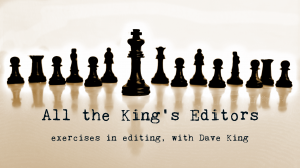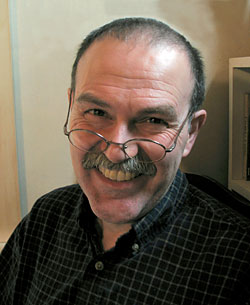The Editor’s Clinic: Building a World in a Hurry
By Dave King | April 17, 2018 |
 This morning we’re looking at another effective opening. Like last month’s example, the first scene isn’t simply dramatic but introduces a likable character (named November) finding a moment of peace in an otherwise miserable life.
This morning we’re looking at another effective opening. Like last month’s example, the first scene isn’t simply dramatic but introduces a likable character (named November) finding a moment of peace in an otherwise miserable life.
But even more, it introduces readers quite effectively to an alternate metaphysics. Note how the author ramps up the strangeness slowly. November’s initial comment about hanging out with the dead in the cemetery could simply refer to the bodies. Then she spots Victor and we learn that she is actually seeing dead people. Then we get another twist, two paragraphs later, when we learn she’s been committed over this vision in the past and so may not actually be seeing what she thinks she’s seeing. Also, I think it’s implied that Victor was talking to the dead (I’ve made that more explicit), which raises the additional question of just who and what Victor is.
Then, with these questions bubbling around, November sees her mother’s ghost – unless she doesn’t, really. Readers don’t know if November’s mother actually died and how, whether November is delusional or genuinely seeing dead people, and just who (or what) Victor is. That’s a lot of reasons to keep reading packed into a small space.
There are a couple of things that still detract. One is, the author frontloads the piece with a bit too much unnecessary information about November’s family – an easy temptation to fall into. Another – and this is true across genres – is that a more intimate point of view will help draw readers into the main character’s world. I’ve edited things so as to make November’s internal state more consistent and inviting.
So here’s how the piece looks after a little polishing.
November thought she just might be happy for the first time . . . ever. [1]
It was tTrue, she had a wicked buzz on, and that often made things seem a little better—or at least dulled the sharp edge of misery — [2] and her sister Alice still didn’t like her much, if at all, but she’d finally found a place she thought she could call home. But better yet, she was far, far from her awful father, and [3] lying next to her was Victor, the most beautiful boy she’d ever seenmet.
She’d met him at Gravesend not long after she’d come to live with her mother. She was still on her best behavior then (well, more or less), and the graveyard was a goodprivate place to drink and be with the people she felt most comfortable with —, namely, the dead. She’d been sort of wandering around the place, drinkingsipping from the silver flask she’d stolen from her father, and reading the tombstones, and imagining the long-gone lives they represented. [4] At some point she’d come across the an old mausoleum, still structurally sound, with windows weathered nearly white and a copper roof gone green. [5] and iIt was there, near the moss-covered steps down to the door, that she saw Victor. Talking with a dead guy.
At first she thought Victor was one dead, too, and it crossed her mind that it was would have been too bad, because he was cute in a sad way. But then she saw how he was just a little bit brighter and lacked that tell-tale shimmer around histhe edges. He’d spotted her a moment or two later, their eyes meeting over the headstones as the last of the day’s light faded away.
She studied him now in the gray morning light and sighed thinking of it.
Sometimes it seemed like a dream, a too–good dream from which she would awaken and find herself back in Wickham or Riverside, the two worst places she’d ever been sentin. She shuddered at the memories, memories of darkness (that’s what they did [6] Wickham is where, when you didn’t meet their expectations;, they put you in dark room and left you there),. Riverside used that awful coat with the buckles so tight they dug into her skin and left bruises. The ice bath was a favorite device there, as well. She thought she’d never get warm again.
She squeezed her eyes shut. Both places badgered her with of unrelenting questions. (How are we today? Are you still seeing people that aren’t there? Why do you think you feel the need to make up stories? She never had good answers. She couldn’t lie, and they wouldn’t listen to the truth. ), the awful coat they made her wear
(the buckles so tight they dug into her skin and left bruises), and the cold. The unrelenting cold. The ice bath was a favorite device. She thought she’d never get warm again.
No. Don’t think of it. Don’t think of any of it!
She closed her eyes tight and pushed the memories down as far as she could.
Victor listened. [7]
When she opened her eyes he Victor was there beside her, sleeping ever so peacefully, and she wanted very much to curl up next him, feel the warmth of him. But something pulled, needling her, urging her to get up and go.
She kissed him gently on the cheek, smoothed his shiny black hair back from his face, and kissed him again. She left him a note and got dressed, quietly let herself out of the flat, and walked up to the pay phone on the corner. Somehow, she knew where she needed to go.
While she waited for the cab a light rain began to fall, and she stepped back inside the glass box to light a cigarette, smoking it fast and lighting another off the end of the first. By the time she arrived in Pemberton Square the rain was coming down hard, and she was wishing for her umbrella.
She had the cab drop her off at her mother’s house number 23, but instead of going in, she did not go up to the house.
Instead she walked down to Gravesend., the cemetery at the end of the road, and w With each step her dread grew, her skin pricking with more than the cold and the rain. By the time she got there she was shivering violently, her teeth chattering and her hands shaking so bad she couldn’t even light a cigarette.
It was there by the locked gates she saw her mother, illuminated by the streetlight that marked the sharp turn.
She was wearing one of her nice suits and a white blouse with ruffles at the neck. Except…it was raining and her mother wasn’t wet.
Oh no. Oh God, no.
The rain fell harder, plastering November’s hair to her head, running down her neck and back. “Mother?”
Her mother turned toward her, shimmering slightly at the edges. I need you to do something, November. [8]
- You don’t need to tell us she’s thinking this. Just show her thinking it.
- If she were feeling this happy, I don’t think she would focus so much on how miserable she usually was.
- This isn’t the point to introduce this background on her sister and father. Readers have no sense of who they are and probably won’t remember this when they meet the father and sister.
- I thought we needed to see into her head a bit more. Besides, giving her another reason to visit the cemetery that has nothing to do with hanging out with the dead sets up the surprise a bit more.
- A little more detail sets the scene and delays the moment of revelation a bit.
- Given the way you describe the memories, readers will know how she felt.
- I thought you should give some hint about what her and Victor’s relationship is like.
- Italics are one way to signal the dialogue of the dead. But it might be better to simply use standard quotation marks. It emphasizes how ordinary November’s communication with them is.
Remember, you’re welcome to submit your own work for one of WU’s stable of editors to review. Just click here for the guidelines. And feel free to jump in and comment or disagree. Editing is an art rather than a science, and it’s worth looking at different points of view.
[coffee]










Great job, Dave—love the detail you added to more fully immerse us in the world and delay the reveal.
More importantly, congrats to the author! What a set-up! Eager to read on.
Thanks. And, yeah, the author done good. Actually, I don’t think I’ve seen a bad submission so far.
This was a fun read. I’d turn the page and read more! Dave, I think your suggestions on how to tighten the prose were particularly effective with one tiny exception. I wouldn’t add the “well” inside the parentheses:
She was still on her best behavior then (well, more or less), and . . ..
That was a judgement call. Your version makes her a little more self-confident. I wanted to add a bit more a sense that she was correcting herself to give her a more complex internal life.
This is actually an excellent example how even single-word editorial choices can affect how your characters come across.
Oh, less self-confident, I see. I hadn’t thought of that, thanks!
Your editing made this world easier to understand in a shorter amount of time. And, thank you for explaining your reasoning behind the edits.
At first, I didn’t know they were sleeping in a flat. I didn’t know where they were. Were they on a bed? November loved the cemetery so much that I pictured them sleeping there, on the grass, with the dead.
The shimmering edges of the dead reminded me of the Twilight vampires. I don’t know if that’s good or bad.
P.S. The names seemed fitting, at least from what I could tell. They have connotations. ‘November’ is modern and gloomy. ‘Victor’ is old-fashioned and serious.
I like the changes, particularly since looking behind the edits the submission is so strong already. The editing makes the style chattier by eliminating some of the chat (or deferring it, I suppose, since I think Alice will be a major character). A good lesson in keeping the narrative light and breezy.
I was a little thrown by the mix of tenses and brief fling with second person: “Wickham is where, when you didn’t meet their expectations, they put you in dark room and left you there. Riverside used that awful coat with the buckles so tight they dug into her skin and left bruises.”
Is it more conversational to say it that way instead of forcing the tense to be consistent? I’m tempted to fix it anyway for the sake of reinforcing the parallel structure: “Wickham is where, when you don’t meet their expectations, they put you in [a] dark room and leave you. Riverside uses that awful coat with the buckles so tight they dig into your skin and leave bruises.”
Talk about serendipity. I cleaned my office today and dusted a stack of “to read” books. “Self-Editing for Fiction Writers” was sandwiched between two other writing books. After watching the difference your editing made, your book is on the top of my list.
Thanks for this “show, don’t tell” instruction.